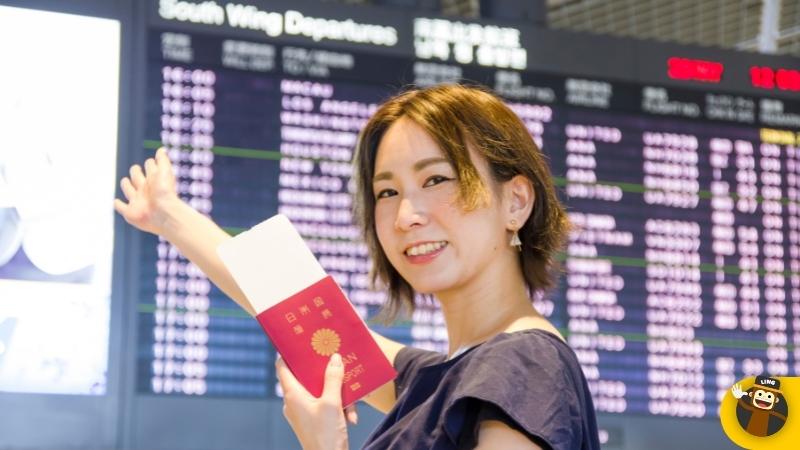The airport will always be the first location you set foot in a foreign country. Therefore, knowing Japanese words for the airport will provide an excellent opportunity to interact with locals.
Several major international airports, including Narita, Kansai, and Tokyo’s Haneda, can be accessed in Japan. If you’re visiting a country where the official language isn’t English, it’s important to know that you shouldn’t assume everyone can communicate with you. Many airport employees don’t speak English, even at major international airports like Kansai, which serves as a busy port and is always full of foreigners.
In this blog, we’ll give you a crash course in Japanese airport vocabulary so we can help you communicate with locals when you finally touch down in Japan!
Collection Of Japanese Words For The Airport

Whether you’re flying within Japan or arriving at the international airport, knowing some Japanese words can help you easily navigate the terminals. It’s time to learn some useful airport vocabulary in Japanese, so the rest of the next journey goes well.
Vocabulary Related To The Airplane
Here are helpful words you need to know when you’re boarded on the aircraft.
| Japanese Word | Pronunciation | English Definition |
| 飛行機 | hikōki | Airplane |
| フライト | furaito | Flight |
| 便名 | bin-mei | Flight number |
| 搭乗券 | tōjō-ken | Boarding pass |
| パスポート | pasupōto | Passport |
| ざせき | zaseki | Seat |
| 通路 | tsūro | Aisle |
| シートベルト | shītoberuto | Seat Belt |
| キャビン | kyabin | Cabin |
| まど | mado | Window |
| 非常口 | hijōguchi | Emergency exit |
| 着陸 | chakuriku | Landing |
Vocabulary Related To The Airport
Here are useful words you need to see once you arrive at the airport.
| Japanese Word | Pronunciation | English Definition |
| チケット | chiketto | Ticket |
| 搭乗ゲート | tōjō gēto | Boarding gate |
| 出発 | shuppatsu | Departure |
| 到着 | touchaku | Arrival |
| 到着ロビー | tōchaku robī | Arrival lobby |
| ターミナルビル | taaminaru biru | Terminal building |
| のりつぎ | noritsugi | Transit |
| 入国カード | nyūkoku kādo | Immigration card or disembarkation card |
| 入国審査 | nyūkoku shinsa | Immigration |
| 査証 | sashou | Visa |
| ビザ | biza | Visa |
| 手荷物受取所 | tenimotsu uketorisho | Baggage claim |
| 税関 | zeikan | Customs |
| 税関申告 | zeikan shinkoku | Customs declaration |
| 課税 | kazei | Taxation |
| 免税 | menzei | Tax exemption / Duty free |
Japanese Conversation At The Airport

Short or long, we all want to make the most of our time in the air, so it’s common practice to book seats in advance and inquire about the flight’s specifics. So let’s look at some sample phrases in Japanese about the airport.
At The Airport Check-In Desk
- チェックインはどこですか?(chekkuin wa doko desu ka?) – Where do I check in?
- 窓側の席を希望します(madogawa no seki wo kibou shi masu) – I would like a window seat
- 通路側の席を希望します(tsuuro gawa no seki wo kibou shi masu) – I would like an aisle seat.
- なぜ飛行機が遅れているのですか?(naze hikouki ga okure te iru no desu ka) – Why has the plane been delayed?
- 超過手荷物料金はいくらですか? (chōka tenimotsu ryōkin wa ikura desu ka?) – How much is the excess baggage charge?
- 出発ロビーはどこですか?(shuppatsu robī wa doko desu ka?) – Where is the departure lounge?
- 出発ゲートは何番ですか?(shuppatsu gēto wa nanban desu ka?) – What gate does this flight leave from?
At Immigration
There’s a high possibility that airport and immigration staff may question you with inquiries as a visitor. In addition, once you reach the international airport in Japan, interacting with Japanese people will be a top priority; thus, knowing a good amount of Japanese vocabulary and phrases is essential.
We advise those who have been studying Japanese for some time to take advantage of this opportunity to practice with native speakers. We’ve provided some sample Japanese dialogues down below.
Conversation Example 1
Question: どちらからいらっしゃいましたか?(Dochira kara irasshaimashita ka) – Where did you come from?
Answer: [name of your country] + から来ました (kara kimashita)
Example → アメリカから来ました (Amerika kara kimashita) – I came from America.
Conversation Example 2
Question: 滞在期間はどの位ですか? (Taizai kikan wa donoguraidesu ka) – How long are you going to stay here?
Answer: [number of days] + 日間です (___kan desu) – For___days
Example → 六日間です (roku kan desu) – For six days
Conversation Example 3
Question: 旅の目的は何ですか?(tabi no mokuteki ha nan desuka?) – What’s the purpose of your trip?
Answer 1: 観光 (kankou) – Sightseeing
Answer 2: ツアー (tsuaa) – Tour
Answer 3: ビジネス (bijinesu) – Business or work
Answer 4: 仕事 (shigoto) – work
Conversation Example 4
Question: 滞在先はどこですか? (taizaisaki ha doko desu ka?) – Where are you staying?
Answer 1: ホテル (hoteru) – Hotel
Answer 2: 友達の家 (tomodachi no ie) – Friend’s house
Conversation Example 5
Question: 申告しんこくするものはありますか? (shinkoku suru mono wa arimasu ka?) – Do you have anything to declare?
Answer 1: いいえ、何もありません (iie, nanimo arimasen) – No, nothing to declare.
Answer 2: はい、あります (hai, arimasu) – Yes, I have (something to declare).
In Summary
When you arrive at a smaller airport, you may find fewer people who speak English than you did at the international airport, as we mentioned earlier. Therefore, knowing some basic Japanese words is usually a good idea. You should start studying the Japanese language right now if you want your trip to go more smoothly and allow you to spend less time waiting around once you arrive.
Do you need top-notch Japanese lessons to help you advance quickly? In that case, you can count on us!
Learn Japanese With Ling App
Ling has developed a fantastic application for Japanese language students worldwide. If you’re worried about mastering even the most challenging aspects of the Japanese language, like writing or grammar, you can take comfort in knowing that we provide a wide variety of courses ranging from beginner to advanced. For example, you can read the Japanese term using a chatbot and listen to the natural Japanese pronunciation. In addition, there are mini-games available whose purpose is to improve the memorization of everyday vocabulary.
Most Japanese learners chose Ling to help them succeed, so why not join them? Download the Ling App from the Google PlayStore and Apple AppStore now, and prepare to be fluent in Japanese soon!
























